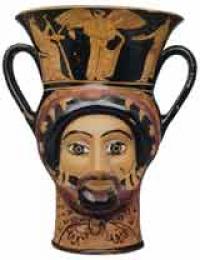
The Major In Classics
 The major in Classics is primarily a liberal arts major, with enormous potential for the pursuit of interdisciplinary interests. Students attain proficiency in Greek and Latin, and are trained to develop powers of critical analysis in studying the important periods and major authors of Greek and Roman literature. Ancient art, history, and culture are studied both as an end in themselves, and as a key to understanding later developments in Western history and civilization. Students are encouraged to take a wide range of courses in neighboring fields such as history, philosophy, and comparative literature.
The major in Classics is primarily a liberal arts major, with enormous potential for the pursuit of interdisciplinary interests. Students attain proficiency in Greek and Latin, and are trained to develop powers of critical analysis in studying the important periods and major authors of Greek and Roman literature. Ancient art, history, and culture are studied both as an end in themselves, and as a key to understanding later developments in Western history and civilization. Students are encouraged to take a wide range of courses in neighboring fields such as history, philosophy, and comparative literature.
Admission to the major
There are no formal prerequisite courses. Students interested in majoring in Classics may start both languages from scratch at Yale, or may enter the program at an appropriate level with prior experience from high school, etc. All students interested in majoring Classics should meet with the Director of Undergraduate Studies (dus.classics@yale.edu) as soon as possible to discuss a program of study, and no later than the beginning of the junior year.
The Standard Major
For information about the Classics major, please see the Yale College Programs of Study guidelines online.
Combined BA/MA program in Classics
Yale allows students to complete simultaneously BA and MA degrees in the same department in 4 years, as long as the student meets certain requirements. In addition to all the regular requirements for the undergraduate major, the student must complete 8 credits in the graduate school (2 of these credits can count both towards undergraduate and graduate credits). For details, please contact the Director of Undergraduate Studies (dus.classics@yale.edu).
The Intensive Major in Greek and Latin
The intensive major is designed for students who desire the opportunity for a larger measure of independence than the standard major offers. Besides fulfilling the requirements of the standard major (in both literatures, in Greek or in Latin), students in the intensive major devote one or two terms in the senior year to writing an essay (CLSS 490a and 491b for the two-term essay, 492 for the one-term essay, fall or spring) under the regular guidance of a faculty adviser. Please see departmental guidelines (opens as PDF) for the senior essay (including a list of key deadlines).
Division of courses
- Courses in Greek and Latin are divided by level:
- Beginning language courses are numbered 110-120.
- Intermediate (second year) language courses are numbered 131–141.
- Advanced courses are numbered in the 400s: except that each year one 400 course is designated a “bridge” course, being intended as a bridge between the 300 and 400 (advanced) level. Students are advised to take this course before other 400-level courses.
- Advanced seminars are numbered in the 600s: these require advance permission of the instructor, and are open only to Juniors and Seniors. If in doubt please consult the DUS.
- Graduate level courses are numbered in the 800s: these may exceptionally be taken by qualified undergraduates, by permission of the DUS and DGS. They are never available on a Cr/D/F basis.